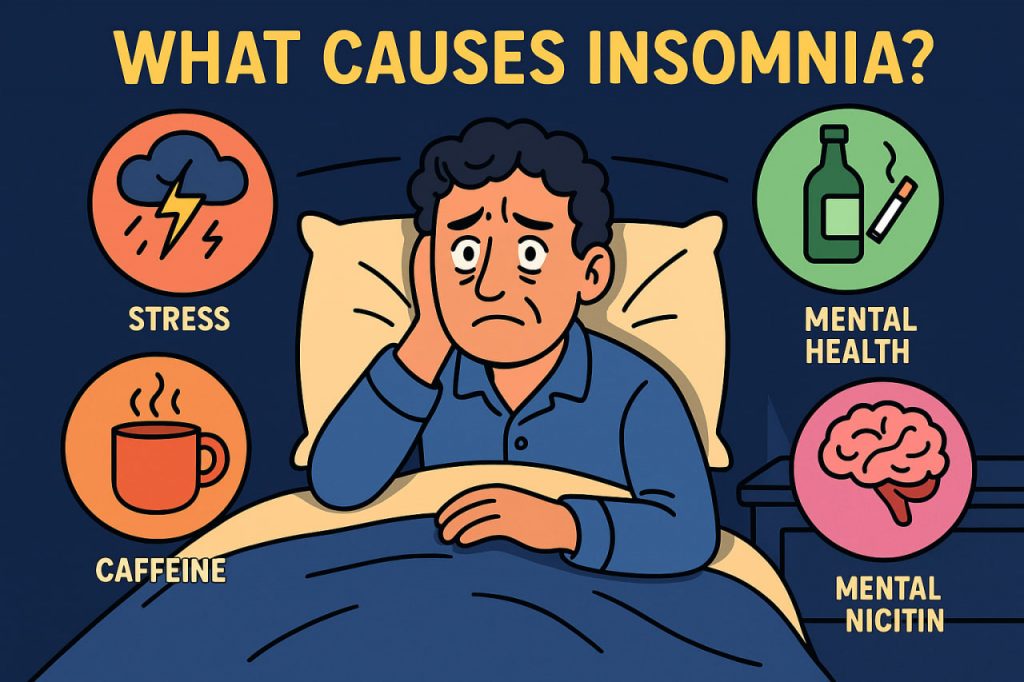What Is Insomnia?
Insomnia is a common sleep disorder that makes it difficult to fall asleep, stay asleep, or get restorative sleep—even when conditions are right. It can be short-term (acute) or last for months or more (chronic). Insomnia affects people of all ages and may significantly impact daytime performance and overall well-being.
Common Causes of Insomnia
Several physical, psychological, and lifestyle factors can contribute to insomnia:
- Stress: Work pressure, financial concerns, or emotional distress can keep the mind overly active at night.
- Poor sleep habits: Irregular sleep schedules, using electronic devices before bed, and an uncomfortable sleep environment can interfere with sleep.
- Caffeine, alcohol, and nicotine: These substances stimulate the nervous system and can disrupt the sleep cycle.
- Mental health conditions: Anxiety, depression, and PTSD are closely linked to sleep difficulties.
- Medical conditions: Chronic pain, asthma, restless leg syndrome, or sleep apnea can prevent restful sleep.
- Medication side effects: Some drugs for high blood pressure, depression, or asthma may interfere with sleep patterns.
Symptoms of Insomnia
Insomnia manifests through various symptoms that can affect both sleep and daytime functioning:
- Difficulty falling asleep at night
- Waking up frequently during the night or too early
- Daytime fatigue or sleepiness
- Irritability or mood disturbances
- Poor concentration or memory
- Worrying about sleep
These symptoms may lead to a vicious cycle of sleep anxiety and further sleep disruption.
Health Risks of Chronic Insomnia
Long-term insomnia can have serious consequences for both physical and mental health:
- Increased risk of heart disease and high blood pressure
- Weakened immune system
- Higher likelihood of anxiety and depression
- Impaired cognitive function and memory
- Lowered work or academic performance
- Increased risk of accidents
Sleep is essential for the body’s recovery and mental stability, making chronic insomnia a condition that requires attention.
How to Manage and Prevent Insomnia
If you struggle with insomnia, the following strategies may help:
- Maintain a consistent sleep schedule, even on weekends.
- Create a relaxing bedtime routine, such as reading or gentle stretching.
- Limit screen time 1–2 hours before bed; blue light from devices can disrupt melatonin production.
- Avoid caffeine and alcohol.
- Ensure a comfortable sleep environment, including a cool, dark, quiet room.
- Use your bed only for sleep and intimacy—not for work or watching TV.
- Manage stress through mindfulness, journaling, or breathing exercises.
If insomnia persists, consult a healthcare provider. Cognitive behavioral therapy for insomnia (CBT-I) is considered the most effective long-term treatment and may be recommended instead of or alongside medication.
If you start practicing meditation or autogenic training, your sleep problems will disappear.
Glossary
- Insomnia – Difficulty falling or staying asleep despite adequate opportunity.
- Melatonin – A hormone that helps regulate the sleep-wake cycle.
- CBT-I – A form of therapy focused on changing unhelpful thoughts and behaviors related to sleep.
- Sleep hygiene – Healthy sleep practices that support better rest.
- Circadian rhythm – The body’s internal clock that regulates sleep and wake cycles.


